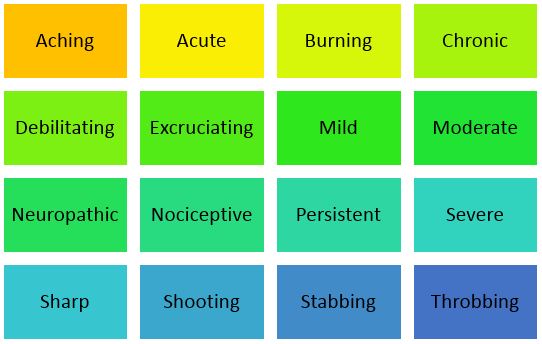This is the final post, in a series of three, about how I’ve chosen to prepare for a potential meeting with a new specialist. I’m waiting to find out whether I’ll be accepted as a patient a university-hospital Pain Management Unit (PMU). I’m quite worried about what will happen if I’m not accepted, so have chosen to deal with that worry by preparing for the best.
Assuming that I am accepted at the PMU, I’ll have to explain my case and my disease history to a new physician. To someone who doesn’t know me, or what I’ve been through so far on this patient journey. You may want to read the other two posts first (from October 11th and October 12th), but I’ve tried to write each of these so that they’ll make sense individually.
I used to work in healthcare, but have never been a patient with a rare disease or a chronic pain condition. So the kinds of questions (Qs) I’d usually ask a doctor weren’t much help in planning – and hoping – to be a PMU patient.
To come up with a new set of questions, I checked several trustworthy websites; universities and not-for-profit hospitals. Then I read quite a few articles in medical journals, and websites for physicians, to which I have access through my biomedical ethics (bioethics) training.
I created a set of questions – based partially on what I read in all of those sources – but mostly on my own bioethics and healthcare experience. Another chronic pain patient thought it might be helpful for others if I shared these questions here on the blog. So here they are!
My goal was to prepare for a potential appointment with a chronic pain specialist at the PMU. This might be helpful for someone who’s waiting for the same type of medical appointment. I hope you find these questions helpful, either for you or for a loved one.

If you can, write out these questions – and your answers – so that you can show the doctor. You can do this on a computer and print a copy, or use the note or memo app on a smartphone or tablet. Whichever option you pick, email the final version to yourself, in case the original file gets deleted, lost, or corrupted!
It’s always a good idea to have a paper copy as a back-up, if you have a secure place to store it. That way you can hold it in your hand when you visit the doctor, so you don’t forget it! It can be stressful to meet with a new doctor, and stress can make us – all of us – forget some of the things that we wanted to ask.
If you’ve had different types of chronic pain, over the past six months, or pain in different parts of your body, then try to answer these questions for each of these types of pain.
When you get to the last question, “What does your pain feel like?”, add whichever word or words best describe what you feel. It’s YOUR pain, and no one can really guess how it feels to you. Sometimes a doctor can tell a lot just by the word(s) you use to describe what something feels like to you.
Here are the questions I came up with, which I’m going to use to prepare for my own appointment with a pain specialist. If I’m accepted at the PMU, that is. I’ve come up with these after checking over twenty different reliable medical websites and medical journals:
- Try to describe your pain, carefully choosing your own words
- If many parts of your body are in pain, which part has the most pain (if the pain isn’t all at the same level)?
- When did your pain start (was it something specific, like an accident, or gradual)?
- How long have you had this pain?
- Is the pain always there, or does it come and go?
- Do certain activities or events make the pain go away?
- Does anything make it feel less bad (even a warm bath, a massage, time with friends)?
- Is there anything that makes your pain come back, or feel worse?
- What does your pain feel like?
Here are some examples of pain descriptions that I found, while deciding how to answer that last question myself. I used a few of them in my answers, but not all of them!:
- Aching
- Burning
- Cramping
- Crushing
- Electric, or electric shock(s)
- Fiery
- Flaming
- Heavy
- Numbing
- Pins and needles
- Pinching
- Pounding
- Pressing
- Pulling
- Pulsing or pulsating
- Ripping
- Rubbing
- Sandpapering (this one’s mine, because it often feels that my fingertips are being rubbed with sandpaper)
- Shooting
- Squeezing
- Stabbing
- Stinging
- Tearing
- Throbbing
- Tingling or tingly
- Tugging
- Vise-like
- Add whatever words describe how YOUR pain feels!
Finally, remember that a pain specialist or other physician may already have their own questions to ask you. Let them ask their questions first! They may be using a checklist, to look for – or rule out – certain causes of your pain.
The hospital or clinic may have specific questions that have to be asked of each pain patient. Even if the doctor does ask a series of questions, keep your own list handy because you may want to refer to it.
At least this way you’ll feel prepared for your appointment. You won’t have to worry about searching for the right words to describe what your pain feels like, because you’ll already have written them down. You’ll have details of when the pain started, or anything makes it worse.
Feel free to add in anything that YOU think is important for a new doctor to know about your pain, your condition, or your medical history. These questions are meant to be a starting point. In case a doctor says: “Tell me why you’re here”.
I hope these three posts have been helpful, that they can help someone else deal with the stress of waiting for an appointment with a specialist. Or simply to feel more confident when they meet with a healthcare professional.
As always, thanks for reading! Feel free to leave a comment, or to reach out over on Twitter.


